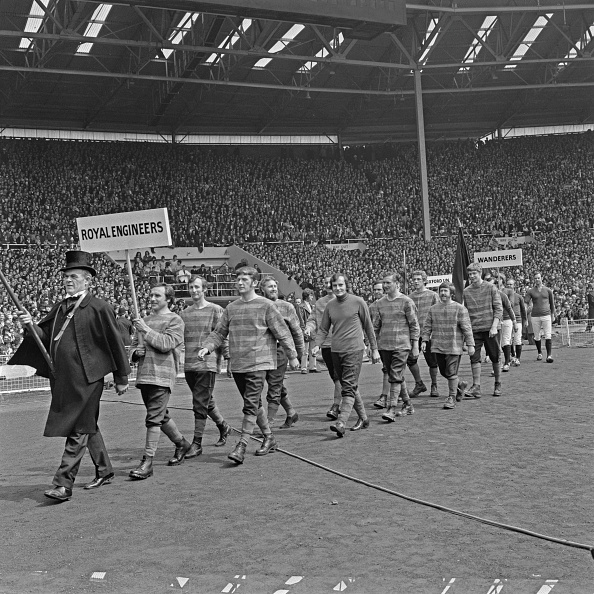
Get the latest financial news, insights and expert analysis from our award-winning MoneyWeek team, to help you understand what really matters when it comes to your finances.
You are now subscribed
Your newsletter sign-up was successful
Want to add more newsletters?

Twice daily
MoneyWeek
Get the latest financial news, insights and expert analysis from our award-winning MoneyWeek team, to help you understand what really matters when it comes to your finances.

Four times a week
Look After My Bills
Sign up to our free money-saving newsletter, filled with the latest news and expert advice to help you find the best tips and deals for managing your bills. Start saving today!
These days, the FA Cup – the oldest cup competition in the football world – is a huge affair, with 737 teams able to enter.
It's quite a money spinner, too. In simple prize-money terms, first round winners in 2020-2021 receive £2,250, with losers taking £750. Winners of the final get £1.8 million. Plus there's all the sponsorship and media money, which can dwarf the actual winnings.
But in 1871-1872, the cup's inaugural season, things were very different. There were just 15 entrants, for a start. And some of the rules would be unfamiliar to today's players, too.
MoneyWeek
Subscribe to MoneyWeek today and get your first six magazine issues absolutely FREE

Sign up to Money Morning
Don't miss the latest investment and personal finances news, market analysis, plus money-saving tips with our free twice-daily newsletter
Don't miss the latest investment and personal finances news, market analysis, plus money-saving tips with our free twice-daily newsletter
Teams changed ends every time a goal was scored; when the ball went out of play, the first team to get hold of it took the throw-in; and in the earlier rounds of the competition, a draw meant both teams progressed to the next round. With so few teams, there were just four rounds.
And so it was that on this day in 1872, 2,000 spectators turned up to the Kennington Oval to watch Wanderers face the Royal Engineers in the first FA Cup final.
Wanderers lined up with eight up front – a not particularly remarkable line-up for the time. The Royal Engineers preferred a more defensive 1-2-7 formation.
Despite the Engineers' use of the radical new “combination game” which included the novel tactic of passing as well as dribbling, none of their seven forwards could manage to get the ball in the net.
After 15 minutes, Wanderers took the lead when full-back “AH Chequers” scored. Chequers was, in fact, Morton Betts playing under a pseudonym. Betts usually played for Harrow Chequers, who Wanderers were supposed to meet in the first round. As it turned out, Harrow withdrew, and Wanderers went through. (Betts also played cricket for Essex, Middlesex and Kent. And in his one appearance for England's national football team, he played in goal.)
The next year, as holders, Wanderers went straight into the final. They would eventually win it five times – three of them in consecutive years.
Get the latest financial news, insights and expert analysis from our award-winning MoneyWeek team, to help you understand what really matters when it comes to your finances.

-
 Should you buy an active ETF?
Should you buy an active ETF?ETFs are often mischaracterised as passive products, but they can be a convenient way to add active management to your portfolio
-
 Power up your pension before 5 April – easy ways to save before the tax year end
Power up your pension before 5 April – easy ways to save before the tax year endWith the end of the tax year looming, pension savers currently have a window to review and maximise what’s going into their retirement funds – we look at how
-
 31 August 1957: the Federation of Malaya declares independence from the UK
31 August 1957: the Federation of Malaya declares independence from the UKFeatures On this day in 1957, after ten years of preparation, the Federation of Malaya became an independent nation.
-
 13 April 1960: the first satellite navigation system is launched
13 April 1960: the first satellite navigation system is launchedFeatures On this day in 1960, Nasa sent the Transit 1B satellite into orbit to provide positioning for the US Navy’s fleet of Polaris ballistic missile submarines.
-
 9 April 1838: National Gallery opens in Trafalgar Square
9 April 1838: National Gallery opens in Trafalgar SquareFeatures On this day in 1838, William Wilkins’ new National Gallery building in Trafalgar Square opened to the public.
-
3 March 1962: British Antarctic Territory is created
Features On this day in 1962, Britain formed the British Antarctic Territory administered from the Falkland Islands.
-
10 March 2000: the dotcom bubble peaks
Features Tech mania fanned by the dawning of the internet age inflated the dotcom bubble to maximum extent, on this day in 2000.
-
9 March 1776: Adam Smith publishes 'The Wealth of Nations'
Features On this day in 1776, Adam Smith, the “father of modern economics”, published his hugely influential book The Wealth of Nations.
-
 8 March 1817: the New York Stock Exchange is formed
8 March 1817: the New York Stock Exchange is formedFeatures On this day in 1817, a group of brokers moved out of a New York coffee house to form what would become the biggest stock exchange in the world.
-
7 March 1969: Queen Elizabeth II officially opens the Victoria Line
Features On this day in 1969, Queen Elizabeth II took only her second trip on the tube to officially open the underground’s newest line – the Victoria Line.
